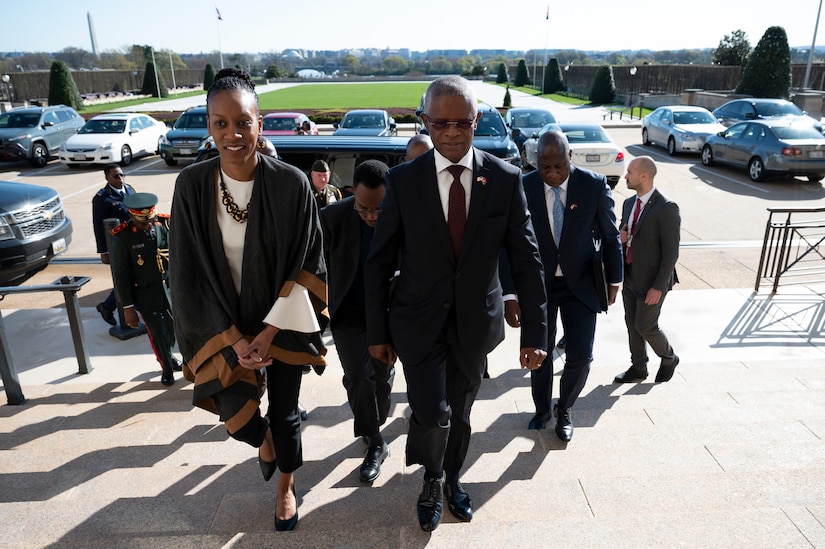U.S. engagement with the nations of Africa has subtly changed with U.S. defense, diplomatic and economic officials listening to African leaders detail their needs, goals, values and concerns, Chidi Blyden, deputy assistant secretary of defense for African Affairs, said.
Blyden spoke to the Defense Writers’ Group yesterday and detailed how the Defense Department and the U.S. Africa Command are working with the nations of the diverse and expansive continent. She spoke in advance of the African Leaders’ Summit that will be held in Washington next week.
DOD’s work with African nations is rooted in the “three D” approach: defense, development and diplomacy. This approach is not new, but DOD and other U.S. agencies are working very hard to learn from past mistakes “and work very closely together with African partners to form genuine partnerships based on mutual respect, trust values and interest,” she said.
The three D approach has always sought to meld the efforts of the State Department, DOD and the U.S. Agency for International Development together with varying degrees of success. “I think the emphasis this time around is going to be that we are going to do this in collaboration, conjunction and coordination with African partners,” Blyden said.
U.S. Africa Command was born with this idea in mind. The command has both Defense and State department leadership, she said. “What we’re doing now is combining and merging these efforts rather than doing them separately, while working in close collaboration with other parts of the government, as well,” the deputy assistant secretary said.
The new approach also includes the private sector to create a “whole of society approach,” she said. “Our new approach will also harness the ingenuity of both the African diaspora and the African populations, leveraging the expertise of our partners and incorporating both,” she said. “Once we unite these efforts, we will recognize and strengthen the unique links that exist between security, governance and development, and we are confident that it will yield … dividends that we haven’t seen in the past.”
DOD and Africom will focus on working with civilian-led defense institutions to reinvigorate efforts to build institutional capacity. The organizations will also work to build and strengthen relationships with the African security sector through education, exercises and training opportunities.
“Our intent is to try and reevaluate the past to see what it can teach us,” she said. “We’re obviously trying to adapt our approach to show that we have learned from it; we’re looking to adopt creative solutions to help turn Africa’s potential into reality. We’ve seen that they have tremendous promise and that they want our support and partnership to do so.”
The United States is not the only nation seeking to work with African nations. China and Russia are also seeking influence on the continent with China seeking allies to change the rules-based international system, and the Russian Wagner Group looking to leach onto struggling states for influence and money.
Still, Blyden reiterated a statement that Secretary of Defense Lloyd J. Austin III has made many times: The United States is not asking nations to choose between the United States and China or Russia. “I honestly believe … that we are the best partner for African nations on a number of issues because we share so many strategic and mutual objectives with African countries — such as climate change mitigation, pandemic relief and support, economic recovery post COVID-19, and obviously countering malign influence from outsiders, actors who don’t have African interests in mind,” she said.
The African Leaders’ Summit will focus on engagement and consultation with African partners. “We want to continue to socialize our approach with African leaders to ensure that the approach continues to address the most pressing challenges and seizes upon Africa’s opportunities as they evolve,” she said. “I’m confident that this approach and the efforts that we’ll make through the African Leaders’ Summit will pay the dividends that we hope to achieve. We want leaders to leave here understanding that the breadth of opportunities to work with the United States are endless.”
(Except for the headline, this story has not been edited by PostX News and is published from a syndicated feed.)


